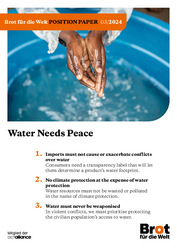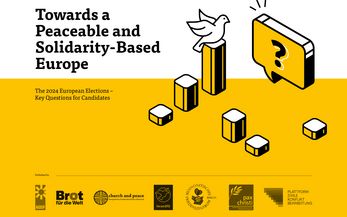At the European elections on 9 June, EU-citizens have the right to influence the composition of the policies pursued by the EU. Peace organisations recommend that European citizens should test the candidates’ positions. ... read full article

For a World without War and Violence
Conflicts over political participation and self-determination, resources and economic power are all too often dealt with through recourse to weapons and the use of force. Violent conflicts frequently arise from oppression and discrimination, displacement and the violation of human rights.
Processes of democratic transformation, conflicts over natural resources, the struggle for social justice and political change can also enhance conflict. Our aim is not to avoid conflicts, but to prevent them from escalating into violence.
Furthermore we wish to support activities that help to overcome existing violent conflicts and to enhance conflict transformation. We also support our partner organisations to reconstruct communities that have been destroyed by war.
Germany's Part in Violent Conflicts
The small-scale farmer opposed to being forced off her land because it is being confiscated for large-scale soya plantations; the herdsman in dispute with farmers over the same piece of land; the lawyer campaigning for the rights of minorities and who is therefore being placed under pressure; the indigenous village community resisting a mining company because it is destroying the environment, livelihoods and sacred sites; the pastor promoting reconciliation and peace after a civil war: All of these people are fighting for more justice, peace and the preservation of creation and thereby coming into conflict with their governments, with companies or other social groups.
The challenge, however, is to ensure that these inevitable conflicts are resolved without violence. Importantly, this can also lead to the development of new relationships and maintain existing ones and, as such, lay the foundations for the peaceful coexistence of all. However, we also see a need to address the root causes of conflict which result from local, national and international policies.
The policies of Germany – and other EU-member states as well – contribute to injustice, environmental damage and conflict situations in many countries of the Global South. Misguided trade and agriculture policies and arms exports lead to an increase of inequality and injustice and contribute to instability and violent conflict. The struggle over land and natural resources is fueled by resource -demanding policies, private investments and our own patterns of consumption. Germany is one of the biggest arms exporters worldwide and arms from German producers are involved in most of the conflicts. Therefore Brot für die Welt (Bread for the World) is addressing these issues in campaigns and talks to political decision makers.
Learning from each other
In many of our partner countries, peace activists work under conditions of political tension, violence or oppression. We are convinced that they know best how to address these situations. However we can assist them in creating space for global and mutual learning. As an example, in 2015, Brot für die Welt held a workshop with partners from 20 countries who live and work in extremely violent contexts – such as Palestine, India, Nigeria, Sudan and Mexico – or in fragile states with long histories of civil war – such as Liberia and Sierra Leone.
The participants shared and assessed experience gained from peace work during and after violent conflict, and the workshop provided an opportunity to learn from one another. Although they were facing many different problems in daily life, they discovered numerous commonalities regarding the root causes of violence. The “lessons learned” shared in the discussions inspired them to test new approaches for conflict transformation. This knowledge and newly constructed networks empowered the activists in their work, and inspired them in maintaining hope for a peaceful and just society, even during protracted crises or periods of recurrent violence.
What Brot für die Welt Does
Working for peace and justice is a long-term process and the responsibility to strive for these values has been outlined by the global ecumenical movement. We share these values and engage in policies that ensure that political and social inequalities are overcome, that human rights are respected and that conflicts are transformed without violence, by addressing the root causes. This requires a long-term commitment aimed at preventing violence, building new relationships based on partnership, mutual learning, trust building, and, above all, giving birth to hope for peaceful change.
- We ensure that civil society’s experiences of dealing with conflicts find their way to policy discussions held by the churches, parliaments, ministries and civil society organisations. This enables us to strengthen the potential for a just peace and increases the knowledge on prevention of violent conflicts and conflict transformation among decision makers and practitioners. And it helps to build the necessary capacities for non-violent civil conflict management. We are convinced that investments in civilian instruments for prevention and settlement of violent conflicts need to be increased, instead of strengthening military capacities that might enhance a new arms race.
- As part of our political work, we campaign against arms exports to countries in crisis. Together with the Joint Conference Church and Development (GKKE) and Aktion Aufschrei, we call for restrictions on small -arms exports, as such weapons spread throughout the world without control.
- We engage in different NGO-alliances, such as the German Platform for Peaceful Conflict Management, where we constantly monitor the work of state institutions and parliaments on civil crisis prevention and conflict management. Furthermore we are members of various networks, such as the Working Group on Peace and Development (FriEnt) and the Civil Peace Service Consortium (ZFD).
Download









